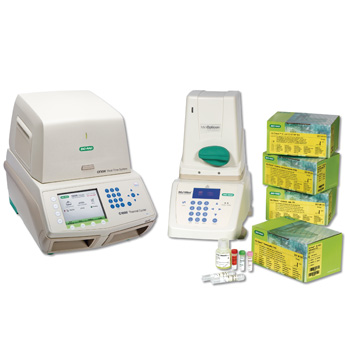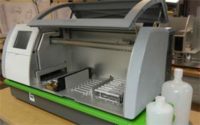When one thinks of gourmet chocolates, one dreams of sweet, creamy confections and rich decadence; microbial contamination and product recalls don’t readily come to mind. However, for those in the chocolate and confectionary product industry, the high-fat content protects microbial cells and allows them to stay viable, even at very low aw percentages, putting this food product at high risk for pathogen adulteration, especially Salmonella. This also means it is virtually impossible to kill contaminating organisms without carbonizing the chocolate, jeopardizing the entire product.
As Salmonella is one of the most common enteric infections in the United States, and salmonellosis is the second most common foodborne illness after Campylobacter infection, it is critical for food producers to be able to detect such contamination before their food products enter the marketplace.
That’s why Kenneth Givich, director of microbiology/compliance at The Guittard Chocolate Company, takes these hazards seriously, closely examining the available solutions for pathogen isolation and detection.
The Guittard Chocolate Company is the oldest, continuously operating, family-owned chocolate company in the U.S., established in 1868 in San Francisco. The company manufactures gourmet chocolate and confectionery products for the food industry, which uses them as quality ingredients in fine candies, cakes, ice cream and pastries. A smaller portion of the product line is sold directly to consumers at retail outlets. For this specialty manufacturer that creates unique, full-flavored and single varietal chocolates for the ever more knowledgeable consumer, especially in high-end applications, any chance that the products are contaminated with a pathogen could mean the end of this highly successful business.
“We have tried most ‘rapid method’ isolation techniques beginning in the 1980s, then going on to more sophisticated kits and finally purchasing a system in the early 2000s. All these ELISA-based systems had the advantage of more rapid isolation, but the disadvantage of false-positive rates that were too high. The system we purchased had an elaborate mechanism that captured the data and required a very high technology service fee per year,” notes Givich, adding that the costs were too high for such a large degree of uncertainty.
The next step involved finding a solution provider that could supply a cost-effective system that did not yield such a high rate of false-positive results. This is where Bio-Rad Laboratories entered the picture. Givich and his team chose Bio-Rad to solve the problem of pathogen isolation for both Salmonella and Listeria that was previously too expensive and not precise enough to exclude false-positive results.
“The PCR system of Bio-Rad gives us greater accuracy of results at a lower price point with no loss in confidence,” says Givich, pleased that its iQ-CheckTM Salmonella and Listeria kits were able to provide such great improvements over their existing system.
The iQ-Check kits are based on the fast, sensitive and proven technology of real-time PCR. The Salmonella kit is intended for detecting Salmonella spp. in environmental samples, as well as in food samples, including poultry, raw meat, eggs, peanut butter, produce and pet food in addition to chocolate and confectionery ingredients. Due to the sensitivity and specificity of PCR, results can be obtained in as little as 12 to 20 hours, following a single enrichment in a nonselective medium. The Listeria kit is used for environmental samples. Results are obtained after a 24-hour enrichment, where most other tests involve a 48-hour enrichment.
The kits use an optimized system of primers and probes to ensure high specificity and eliminate cross-reactions. They are designed as a multiplex reaction that includes an internal inhibition control that is amplified in parallel with the target DNA for a reliable result. Developed as an open and flexible system, reactions can be performed on low- or high-throughput instruments, depending on the laboratory’s needs and have been optimized for real-time PCR with Bio-Rad detection systems. Different iQ-Check tests, including those for Salmonella, Listeria spp., Listeria monocytogenes, Campylobacter, E. coli O157:H7 and Cronobacter spp., can also be run in parallel since all of the protocols are exactly the same. Several certification bodies have validated these kits, and the validation studies have shown that the kits are equivalent to or better than the various reference methods evaluated and provide results in much less time.
When asked how this solution has impacted their business and benefited the company, Givich replies, “No product is released before Salmonella results are completed, and many of our customers require a certificate of analysis with the product. As the product line has increased (we now have over 550 SKUs [stock-keeping units]), many products are built after the order is placed. This means that microbiological results will define exactly when the customer receives the product; a false-positive [result] will increase that time frame considerably.”
“Using the Bio-Rad PCR system has reduced our overall costs for both Salmonella and Listeria testing as much as 20 percent, while at the same time increasing our confidence in the final data stream due to the specificity of the DNA-based analysis. This means that the front office will be happy with our budget, and customers will not have to wait to receive their orders any longer than necessary.”
bio-rad.com
Rapid Pathogen Testing Yields Sweet Rewards For Chocolate Company




